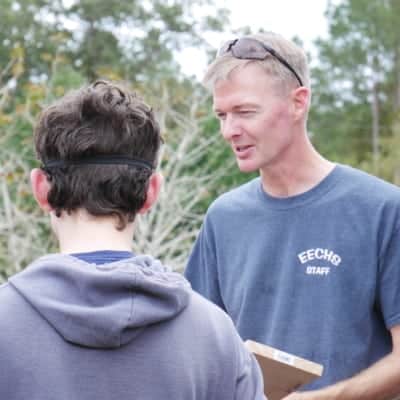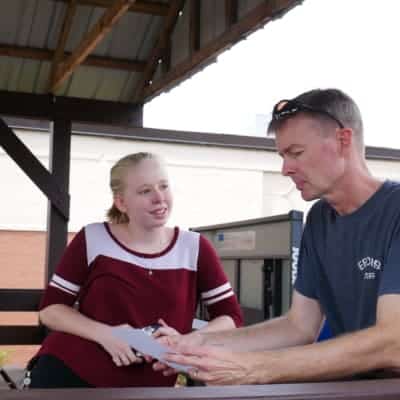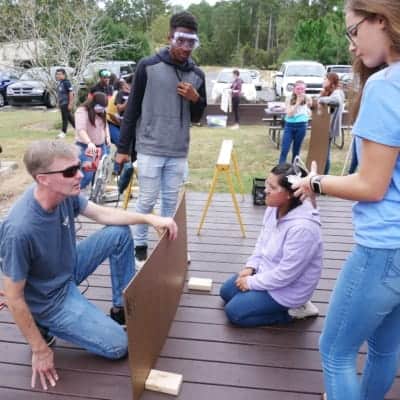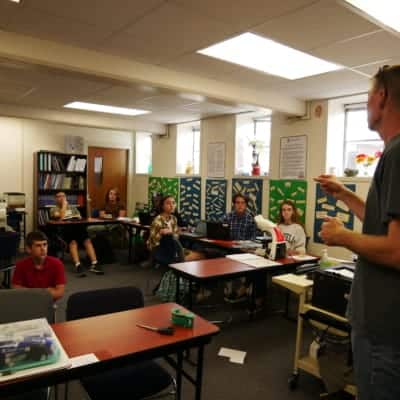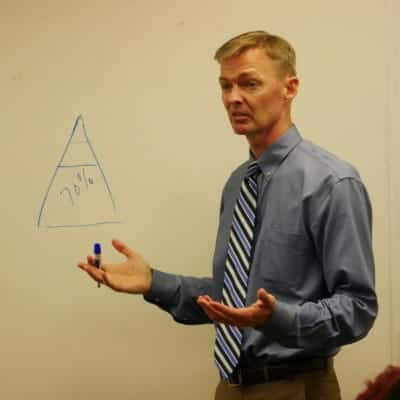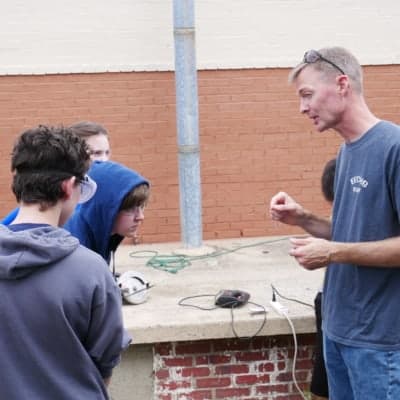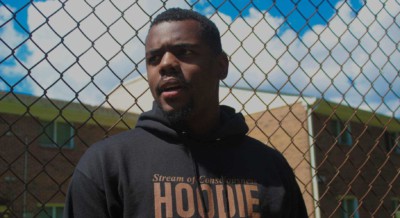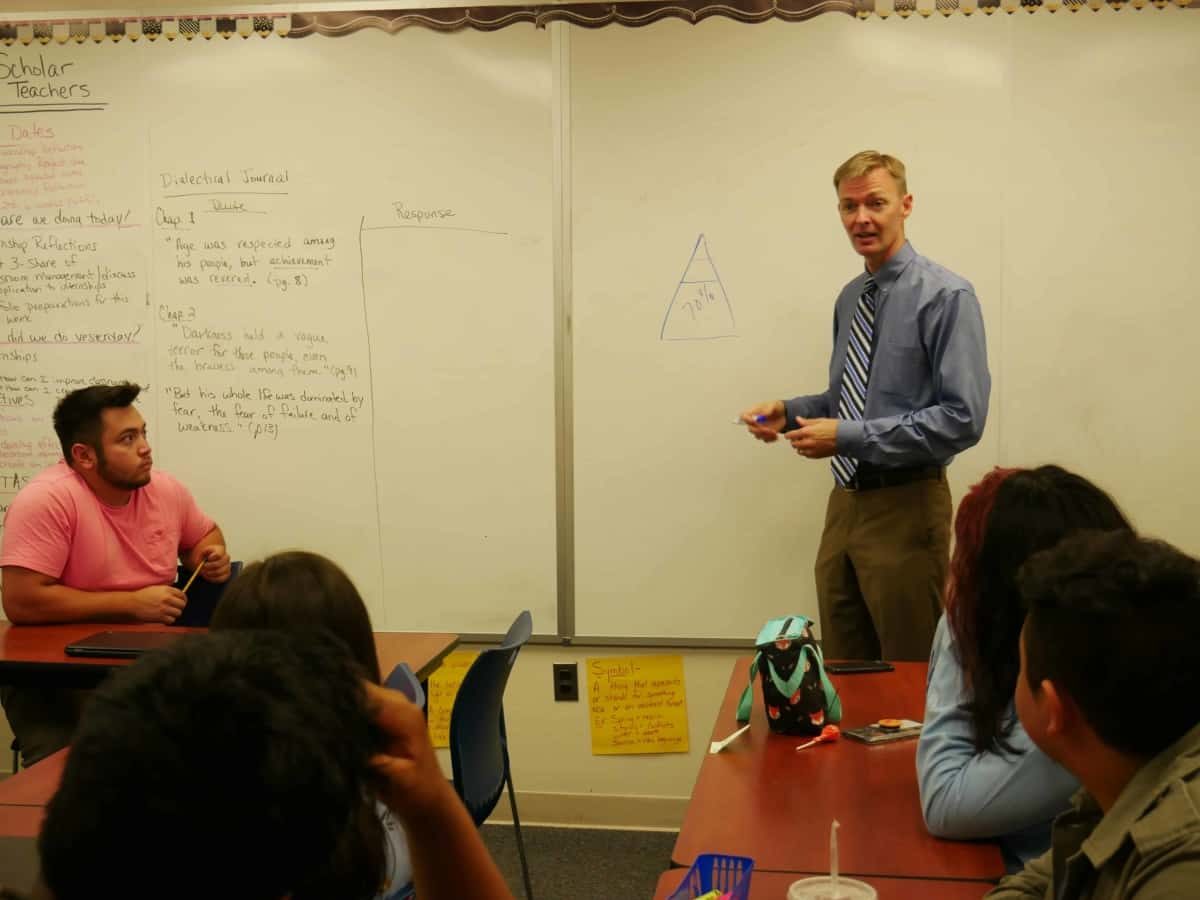

Matt Bristow-Smith, the principal at Edgecombe Early College High School and North Carolina Principal of the Year for 2019, knows the stories of his students.
“Every kid has a narrative,” said Bristow-Smith, who has been at the head of the early college for five years. “You need to know them in a small school.”
When one student’s grandfather committed suicide in the family home they share, the principal was the first person called.
“That was the week of our exams,” the student said. “Mr. Smith did not hesitate a minute to come to my house and make sure I was OK.”
The student, who was in the next-to-last year at Edgecombe ECHS, said Bristow-Smith contacted college instructors at Edgecombe Community College. Met with understanding and support, said the student, “There was just this sense of like, ‘I don’t have to worry about all of this.’”
“I know that’s an extreme situation but, you figure, we live in eastern North Carolina,” the student said. “There’s a lot of poverty. There’s a lot of families who have situations that they can’t control happen, and Mr. Smith and this staff will never turn us away or say they can’t help or that that’s not their problem. They have the biggest hearts that I’ve ever seen to be a school staff.”
Although this past year has kept Bristow-Smith busier than ever, traveling to engagements throughout the state and sitting as an advisor on the State Board of Education, he is deeply involved in students’ lives and in their education. He remains close to students’ educational journeys in several ways instead of falling into a solely administrative role. During a hot October day this fall, Bristow-Smith was changing into jeans and a T-shirt to help students with construction outside.
Between teaching students how to use power tools, Bristow-Smith was reviewing project proposals from students for their junior internships and senior projects. He would call a student over and provide feedback, connecting them with community resources and guiding the scopes of their projects.
“I didn’t go into principalship to not be engaged with kids in the classroom,” he said.
He also grades essays students write for an independent reading program, which he said ensures that students read an extra 40 to 50 books outside of their assigned reading for specific classes. “It keeps me connected with them as learners, and it also allows me to manage the reading program without putting it on my teachers to have to manage,” he said.
Bristow-Smith is able to stay in touch with students personally and academically partly because the school is small. Capped at 200 students, Edgecombe ECHS is one of more than 100 Cooperative Innovative High Schools (CIHS) across the state. The schools, given supplemental funding by the state, give students a head-start on college courses free of cost, normally through a connection to their local community colleges.
Edgecombe ECHS outperforms its district and state averages in subject-level proficiency. The school has earned A’s each of the last four years on the state’s grading system. Last year, 96% of students finished high school with an associate degree, compared with about half of CIHS students across the state.
What’s the recipe for success?
This is the school’s 15th year. Bristow-Smith said he and his staff have been able to find intentional structures along the way that set students up for success and degree completion. He said he “drew a line in the sand” when he came to the school on the importance of the “super senior” year. He noticed tons of stress leading to burnout in students’ fourth year of the early college experience. That was reflected in students’ senior year GPAs, he said.
“We really committed to the fact that our rush is not just for kids to earn credits,” he said. “Our rush is for kids to discover their passions, and then we want to create a learning plan for them that helps them to tap into those passions and to customize their learning experience so that when they graduate from us, they’re ready for what comes next. That’s our mission.”
Besides encouraging students to take a fifth year to complete their degrees, Bristow-Smith said the high school has added a foundational math course and a writing-intensive English seminar that prepares students early in high school for community college courses later in high school.
“We don’t assess writing anymore, so many folks don’t teach it,” he said. “[The seminar] ramps up students’ readiness to take college-level English.”
While juniors and seniors take more courses on the college campus and less in the high school experience, two major projects keep them connected to their high school. During junior year, students create a project centered on an internship with some outside organization or experience. The staff helps facilitate those connections, and — as Bristow-Smith was doing during construction class — guides students to ensure a meaningful real-world learning experience. Bristow-Smith said creating opportunities for students to interact with institutions and professionals is valuable for students’ learning, self-discovery, networks, and career planning.
“It recognizes the fact that every one of these kids needs opportunities to develop their soft skills … to do career exploration, to do interviewing, to interact with professionals.”
Every year, Bristow-Smith organizes a professional speaker series to pair with outside internships. The speakers, from several professions, share their personal and professional journeys. Bristow-Smith tells the presenters to talk about not just their careers but their lives — including the “curveballs and pitfalls and potholes and roadblocks.”
“So often we bring in business people and they talk about their career,” he said. “What they don’t talk about is their life path that got them where they are, and so this guest speaker series is really critical because it helps kids to build empathy with each other and empathy with adults.”
In their senior year, students move on to another project, again created around their interests and career goals. This can be, and often is, connected to their junior internship.
“The goal there is to help kids deeply invest themselves in their learning so that they have more self efficacy, they have more student agency, that they have a greater sense of investment in the work that they’re doing.”
Along the way, students benefit from close relationships and individualized support from teachers and Bristow-Smith. “Family” was a word that not only Bristow-Smith used to describe the school community, but that students and teachers mentioned multiple times. To create that environment from day one, Bristow-Smith beefed up an orientation program started before he arrived from a half-day four-week introduction to the school to a full-day, full-week experience, complete with a ropes course, a campus tour of East Carolina University, a STEM lesson with a community college instructor, and a service project.
“When school starts the first day of the school year, it’s like a family reunion,” he said.
Watch the video below to hear more about what Bristow-Smith thinks makes an effective school leader.
Supporting first-generation college-goers
Under the state’s CIHS designation, schools must focus on at least one of three student populations: students who would benefit from an accelerated academic environment, students at risk of dropping out of high school, and first-generation college students — which is Edgecombe ECHS’s focus. More than 80% of students have parents who did not attend college.
“It’s important to us that we identify first-generation college students so that we can help to create new cycles for them of opportunity,” he said.
This factor is one of many on a rubric the school uses during the application process, along with working closely with middle school counselors and teachers and in-person interviews with students and their families.
“If I were to draw a really keen distinction here, it’s that the process is not competitive, it’s about compatibility,” he said.
As far as academic standing, Bristow-Smith said there is a misconception that early-college programs only take high-fliers. He said he often accepts students who, often for social and family reasons, have not performed at their highest potential.
“Sometimes we will see that many of our students had really terrible middle school experiences,” he said. “Maybe they were bullied. Maybe they were outliers in their social networks in middle schools, so they need a reset in a school that’s going to embrace them and celebrate who they are. … Sometimes we have kids that have untapped talent and potential that we feel like here we can uncover and help them get to know themselves.”
That was the case for Sarah Heath, in her fifth year at the school, who said her early college experience changed her path dramatically. If she had not tried something else, she said, “I would probably not be in a good place.” She said Bristow-Smith told her she could have a promising future despite her poor grades.
“I didn’t necessarily have the grades or anything, but he was like, basically I have the potential to grow, so he took the chance,” Heath said. “And that’s what’s so important about him is he doesn’t discriminate … it’s like, ‘I see something in you and I want you to come here and grow with that.'”
Several students had similar stories, of lonely or tough middle school experiences that left them wanting a different environment. Chantel Evans, a senior, said she lacked support in middle school.
“People always see the bad sometimes,” she said. “They’re like, ‘Oh you’ve got a record of three fights and you’re no good.'”
Abdur Gant, a senior whom Bristow-Smith brought with him to the Principal of the Year induction ceremony, chimed in.
“You know how bad it is for people to tell you stuff like that?” Grants said. “It hurts your feelings. … They care about you here, they care.”


